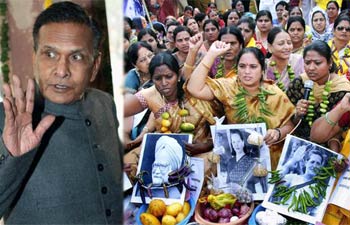
New Delhi, August 20: Union minister for Steel Beni Prasad Verma on Monday stoked a controversy with his comment that price rise was beneficial for farmers. The opposition pounced on his remark accusing the government of being part of the "mehengai mafia" (price rise mafia).
The minister made the
remark on Sunday while talking to reporters on the sidelines of a function in Barabanki, near Lucknow. Asked to comment on price rise, Verma said the government was taking steps to tackle it, but he was happy with the rising prices of food items as it was beneficial to farmers.
"With the increasing price levels, the farmers are benefitting. Dal, atta, vegetables have all become expensive. I am happy with this price rise. The more the prices rise the better it is for farmers," the minister said.
His remark attracted criticism from the opposition Bharatiya Janata Party (BJP) with party leader Shahnawaz Hussain saying that though the government maintains it is for the common man, the minister's remark showed it has "actually moved far away from the people".
However, BJP leader Mukhtar Abbas Naqvi was more critical, saying the government was the "Mogambo" or villain of price rise. He was referring to a popular portrayal of a villain from a Hindi film.
"The government is the mehengai ka Mogambo. It is certain that when prices rise, when there is unemployment and farmers commit suicide... then it is but natural that the mehengai ka Mogambo will be happy," Naqvi told reporters.
"The government has become a member of this mehengai mafia and that is why when the common man mentions price rise, they are happy."





Comments
Add new comment